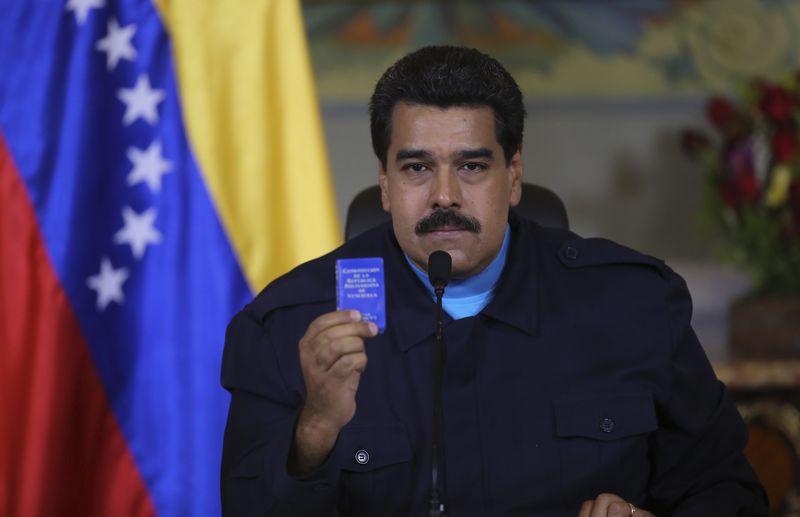By Jeff Mason and Roberta Rampton
WASHINGTON (Reuters) - The United States declared Venezuela a national security threat on Monday and ordered sanctions against seven officials from the oil-rich country in the worst bilateral diplomatic dispute since socialist President Nicolas Maduro took office in 2013.
U.S. President Barack Obama signed and issued the executive order, which senior administration officials said did not target Venezuela's energy sector or broader economy. But the move stokes tensions between Washington and Caracas just as U.S. relations with Cuba, a longtime U.S. foe in Latin America and key ally to Venezuela, are set to be normalized.
Venezuelan President Nicolas Maduro denounced the sanctions as an attempt to topple his government. At the end of a thundering two-hour speech, Maduro said he would seek decree powers to counter the "imperialist" threat, and appointed one of the sanctioned officials as the new interior minister.
Declaring any country a threat to national security is the first step in starting a U.S. sanctions program. The same process has been followed with countries such as Iran and Syria, U.S. officials said.
The White House said the order targeted people whose actions undermined democratic processes or institutions, had committed acts of violence or abuse of human rights, were involved in prohibiting or penalizing freedom of expression, or were government officials involved in public corruption.
"Venezuelan officials past and present who violate the human rights of Venezuelan citizens and engage in acts of public corruption will not be welcome here, and we now have the tools to block their assets and their use of U.S. financial systems," White House spokesman Josh Earnest said in a statement.
"We are deeply concerned by the Venezuelan government's efforts to escalate intimidation of its political opponents," he added.
Venezuela called home its charge d'affaires in Washington for consultations, and Maduro accused Obama of a "colossal mistake" and "imperialist arrogance" similar to his predecessors Richard Nixon and George W. Bush.
"President Barack Obama ... has personally decided to take on the task of defeating my government and intervening in Venezuela to control it," Maduro said in a televised address.
In response, Maduro said he would on Tuesday ask the National Assembly, controlled by the ruling Socialists, to grant him decree powers - for the second time in his nearly two-year rule through a so-called Enabling Law, which critics blast as a power grab.
Maduro also paraded the seven officials, hailing them as "heroes" and naming national intelligence head Gustavo Gonzalez, whom Washington accuses of complicity in violence against protesters, as new interior minister.
DENIED ENTRY
The two countries have not had full diplomatic representation since 2008, when late socialist leader Hugo Chavez expelled then-U.S. Ambassador Patrick Duddy. Washington responded by expelling Venezuelan envoy Bernardo Alvarez.
The list of sanctioned individuals includes: Gonzalez, the head of state intelligence service Sebin; Manuel Perez, director of the national police; and Justo Noguero, a former National Guard commander who runs state mining firm CVG. It also includes three other military officers and a state prosecutor.
The individuals' would have their property and interests in the United States blocked or frozen and would be denied entry into the United States. U.S. citizens and permanent residents would be prohibited from doing business with them.
The White House also called on Venezuela to release all political prisoners.
"We've seen many times that the Venezuelan government tries to distract from its own actions by blaming the United States or other members of the international community for events inside Venezuela," Earnest said in the statement.
U.S. officials told reporters in a conference call that the executive order did not target the Venezuelan people or economy and stressed that upcoming legislative elections should be held without intimidation of government opponents.
The sanctions effectively confirm Venezuela as the United States' primary adversary in Latin America, a label that was for decades applied to Communist-run Cuba until Washington and Havana announced a diplomatic breakthrough in December.
Washington said last week it would respond through diplomatic channels to Venezuela's demand for it to cut the U.S. Embassy's staff in Caracas after the government called for a plan within 15 days to reduce staff to 17 from 100 at the American facility.
Commercial ties between Venezuela and the United States have largely been unaffected by diplomatic flare-ups, which were common during Chavez's 14-year-rule.
The United States is Venezuela's top trading partner, and the OPEC member in 2014 remained the fourth-largest supplier of crude to the United States at an average of 733,000 barrels per day - despite a decade-long effort by Caracas to diversify its oil shipments to China and India.

Opposition leader and twice-presidential candidate Henrique Capriles told Reuters the sanctions were a problem for a corrupt elite in the Maduro government, but not ordinary Venezuelans.